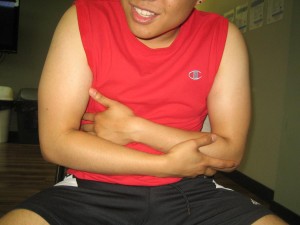The colon is a segment of the large intestine. Once food has been broken down in the stomach and absorbed in the small intestine, undigested food matter moves via the colon.
The colon absorbs any leftover water, salts and vitamins from food and transforming it into fecal matter. This is moved from the sigmoid colon to the rectum where it is eliminated out of the body.
Characteristics
The signs of possible disorders in the colon typically include:
- Stomach pain
- Bloating
It is important to note that the colon is susceptible to inflammation and inflammatory ailments that can be triggered by stress, diet, lifestyle and certain medications. - Constipation
- Gas
- Diarrhea
- Abdominal cramps
- Fatigue
What are the causes?
It is important to note that the colon is susceptible to inflammation and inflammatory ailments that can be triggered by stress, diet, lifestyle and certain medications.
A healthy colon can effectively get rid of waste from the body. If it is unhealthy, it can result to various painful conditions. The common disorder affecting the colon are inflammatory bowel ailments such as:
- Crohn’s disease
- Ulcerative colitis
- Irritable bowel syndrome
- Diverticulitis
- Colorectal cancer
Management of colon pain
The inflammatory bowel diseases are brought about or aggravated by a poor diet. Due to this, it is vital to stick to a healthy diet.
Limit the intake of certain foods
The initial step in managing colon pain is to adjust the diet to check if it can lessen the pain and inflammation. Some of the foods that contribute to increased inflammation include:
- Coffee
- Red meat
- Alcohol
- Fried foods
- Processed carbohydrates
- Refined sugar
Lifestyle adjustments
The management of colon pain is to make lifestyle adjustments by eliminating behaviors that detrimentally affect the health of the colon such as:
- Cigarette smoking
- Lack of exercise
- Sedentary work environment
Medications
Any medications must be reviewed. If possible, stop using NSAIDs such as ibuprofen and aspirin that increases inflammation and affect the intestinal lining. The doctor can provide suitable alternatives.
Fiber intake
Dietary fiber helps hasten the process of waste elimination which cuts down constipation and inflammation. With sufficient roughage in the diet to keep the bowel moving, the strain and pressure exerted on the colon is lessened.
Increasing the intake of water can also help in preventing hard, painful stools. It is suggested to drink at least 8 glasses of water a day to maintain proper hydration of the body.
Exercise
A sedentary lifestyle or highly strenuous activity can aggravate the colon; thus, it is vital to take time to relax and allow the body with enough exercise.

